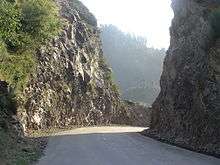Mughal Road
Mughal Road (Urdu: مغل شارع) is the road between Bafliaz, a town in the Poonch district, to Shopian district in the Kashmir valley. The road is 84km long, and situated in the Jammu and Kashmir state of India.[1] It passes over Pir Panjal Mountain range, at altitude of 11,500 ft (3505 m), that is higher than Banihal pass (2832 m).[2]
The road brings the Poonch and Rajouri districts closer to Srinagar in Kashmir valley, and reduces the distance between Srinagar and Poonch from 588km to 126km.[3] It makes for alternate road route to Kashmir valley from rest of India, other than over-crowded Jammu-Srinagar Highway through Jawahar Tunnel (Banihal Tunnel) (National Highway 1A).[4] The road passes through Buffliaz, Behramgalla, Chandimarh,Poshana, Chattapani, Peer Ki Gali, Aliabad, Zaznar, Dubjan, Heerpora and Shopian.
The road was historically used by Moghul emperors to travel and conquer Kashmir during the sixteenth century.[5] It was the route used by Akbar the Great to conquer Kashmir in 1586, and his son Emperor Jahangir died while returning from Kashmir on this road near Rajouri.[6]
Construction

The new road was proposed in the 1950s, with the intention of improving the economy of the valley of Kashmir. Then Chief Minister Sheikh Abdullah had taken up this project in 1979 and named it "Mughal Road", but it came to halt as militancy took over. Bafliaz Bridge on the road was blown up by the militants.[7]
The construction of the prestigious project was started in October 2005 with a target of completion in March 2007 and an estimated cost of INR 255 crores.[8] The road cuts through Hirpora Wildlife Sanctuary. Initially, there was serious opposition to the construction of the road by vested interests on the excuse of fragmentation of wildlife and inhibit movement of animals, especially the endangered Markhor goat in the region.[9] Also, opponents claimed the road will get early snowfall in winter and hence will not serve as an alternate route to existing Jammu-Srinagar highway. Finally Supreme Court gave conditional permission for the construction of the road.[8] The construction work was to be completed in December 2008,[10] however, it got delayed for a number of reasons including the Amar Nath land row. Officially the road was opened for the first time on 12 July 2009 for inspection by a Standing Committee of the Jammu and Kashmir Legislative Council comprising Murtaza A. Khan Hon'ble MLC (Chairman), Mohammed Yousaf Taing and Jehangir Mir Hon'ble MLCs and vice chairman legislative council(Members), superior officers and engineers of the R&B Department and engineers of the executing agency HCC and other concerned officials. It was supposed to be thrown open for light vehicles in October 2010 but the law and order situation arising in Kashmir in 2010 once again marred its timely completion.[1][11] Double lane road has already been completed as of August 2012. .[12]
Beginning 2010, Mughal Road Car Rally[13] is being organized every year covering 600 km including the picturesque stretch through Pir Panjal.
See also
While a fresh deadline of 31 July 2013 has been fixed for completion of the road, the state government is hopeful of throwing it open before that. "We are quite optimistic that by the end of October this year, we will substantially complete the road surface, minus seven bridges. Next year we will be completing the bridges as well. We are hopeful to throw the road open for light motor vehicles before next year itself, if all goes as planned," says Bimal Tikoo, Chief Engineer Mughal Road. "We are under pressure to complete the project. Local politicians and ambitious people want us to be quick. We are hopeful to complete substantial road surface work by October2011 this year."
References
the mughal road will be open October 2011